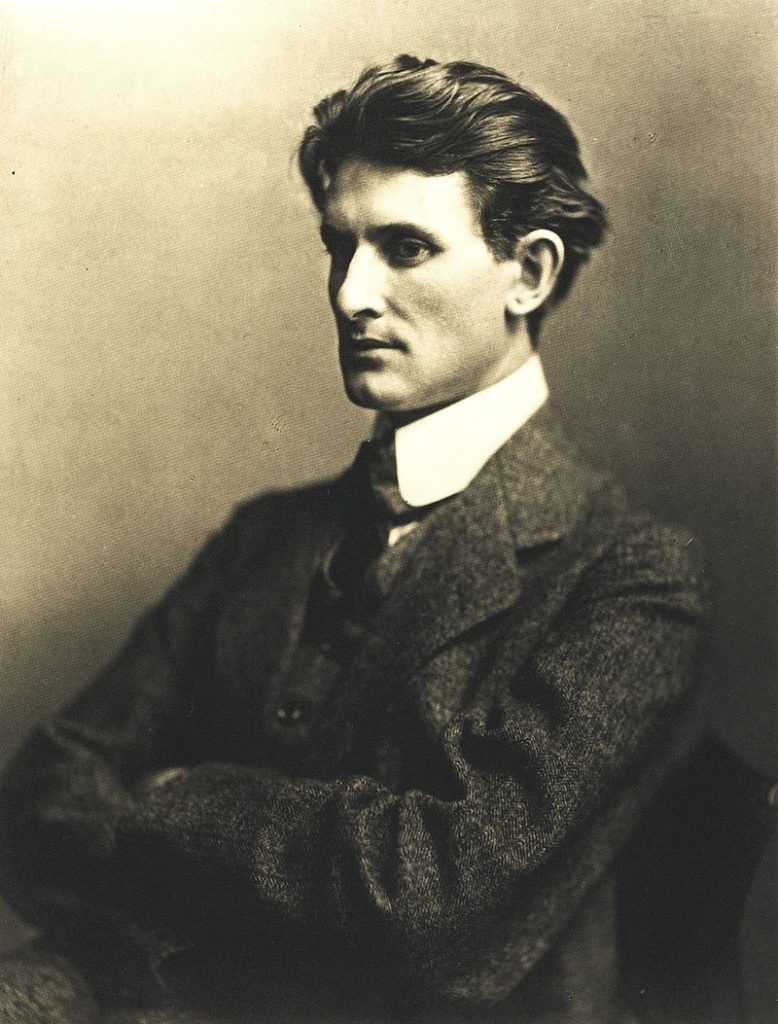
The library of poet and professor Friedrich Gundolf (1880-1931) reveals valuable insights into his scholarly and literary influence. Together with his wife, economist Elisabeth Salomon Gundolf (1893-1958), he shared a personal and professional life uncommon in its contemporary social and literary impact, and shaped in its turn by their turbulent times. The Gundolf collection in the Senate House Library today exhibits a broader range of the intellectual network in which both Gundolfs lived and worked.
As Michael Thimann recounts in his bibliobiography, Cäsars Schatten: Die Bibliothek von Friedrich Gundolf—Rekonstruktion und Wissenschaftsgeschichte [Caesar’s Shadows: A Reconstruction and Scholarly History of the Library of Friedrich Gundolf], Gundolf’s library was created from his scholarship, bibliophilia, and antiquarian passion. With pride, pleasure, and sometimes seeming guilt for extravagance, Gundolf would report his latest acquisition in an unlikely city or bookseller’s store in letters to friends and fellow authors. Thimann’s scholarship focuses on the resources, in Latin and in German, that helped Gundolf construct his seminal book Shakespeare und der deutsche Geist [Shakespeare and the German Spirit].
As a scholar of Shakespeare in the German language, Gundolf impacted a generation of readers and intellectuals by relating the influence of the English playwright on German culture in an era that saw the end of London’s formal involvement in the Hanseatic League. His scholarship could have been supported with 18th-century editions of Shakespearean plays by Johann Joachim Eschenburg and August Wilhelm Schlegel, as well as Friedrich Martin von Bodenstedt’s collection of Shakespearean sonnets. Of his contemporaries writing in the early 20th century, Gundolf owned Robert Hessen’s 1904 biography Leben Shakespeares [Life of Shakespeare], Levin Ludwig Schücking’s 1908 literary-critical monograph, published in Heidelberg, Shakespeare im literarischen Urteil seiner Zeit [Literary Opinions of Shakespeare in his Time], and Johannes Meissner’s 1914 Jung-Shakespeare [Young Shakespeare], published in Vienna.
Gundolf’s writings on and translation of Shakespeare, as well as his writing on Caesar, the Latin-language poets, and the poets and writers of antiquity, may well have informed his own creative practice. As Philipp Redl details in Dichtergermanisten Der Moderne: Ernst Stadler, Friedrich Gundolf Und Philipp Witkop Zwischen Poesie Und Wissenschaft [Germanist Poets of Modernism: Ernst Stadler, Friedrich Gundolf and Philipp Witkop between Poetry and Scholarship] the tension Gundolf felt mediating between his early poetic talent and acclaim as one of Stefan George’s intimates, and the maturation of his scholarly vocation did not fully dissipate. The historical and contemporary German-language poetry that also forms Gundolf’s sphere of influence appear in his library, such as a 1698 edition of Andreas Gryphius’ poems, and an edition of poetry and translations by Christian Hofmann von Hofmannswaldau from the 1680s, both published by the Fellgiebel family press in what is now Wroclaw (then Breslau). Generations of poets, from Friedrich Canitz through Anna Louisa Karsch and Albrecht von Haller to Adolf Glassbrenner, exemplify an array of 16th- and 17th-century German-language literature here, as well as translations across genres into German, including 16th-century translations of Petrarch by Stephan Vigilius, of Homer by Simon Schaidenraisser, and of Livy by Bernhardus Schöfferlin, Juo Wittig von Ham-melburg, Nicolaus Carbachius, and Jacobus Micyllus.
Elisabeth Gundolf oversaw the removal of her husband’s library to England after his death and her subsequent exile from Germany to Oxford. Her advocacy of his legacy also resulted in the publication of a translation of his edition of Hölderlin’s Der Archipelagus [The Archipelago] in London and then his biography of Frank Wedekind, both of which appear in the Senate House collection. The survival of the remaining collection is due to her attention and effort, as is its safekeeping at the University of London’s Senate House Library through bequest in 1961.
Jillian Saucier, Boston University
